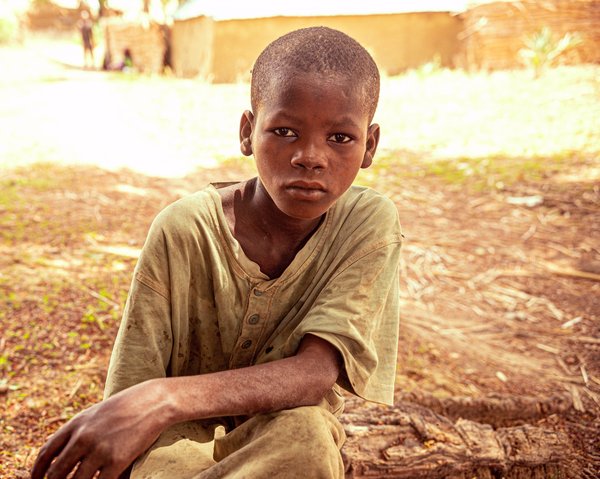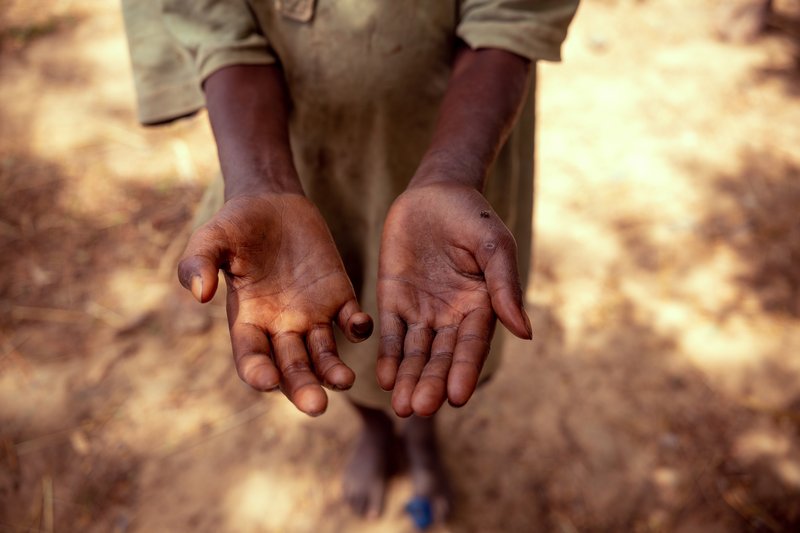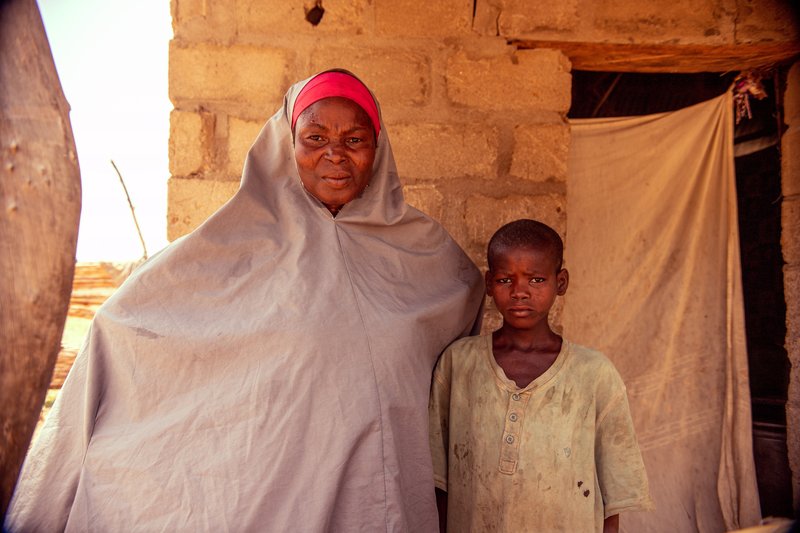Leprosy Mission and Parliamentarian call for the immediate delivery of leprosy drugs to Nigeria

Charlotte Walker - Senior Media and Communications Officer
The Co-Chair of the All-Party Parliamentary Group on Malaria and Neglected Tropical Diseases is calling for the immediate delivery of drugs to treat leprosy in Nigeria.
For 11 months Nigeria has been without Multidrug therapy (MDT), the antibiotic cure for leprosy, due to a critical supply chain crisis.
This has left 3,000 people, including 800 children, at risk of developing irreversible disabilities. Or like 10-year-old Nasiru, pictured, with leprosy tragically left to further debilitate his young body.
Leprosy is one of the World Health Organization’s 21 Neglected Tropical Disease. It is a blight on humanity and should not exist in the 21st Century. Leprosy has been entirely curable since 1982 with MDT, a combination of three antibiotics.
Yet leprosy continues to disproportionally affect the world's poorest and most vulnerable communities. Overcrowding, malnutrition and a lack of sanitation lead to weakened immune systems. This creates a perfect breeding ground for the disease to spread. It explains why there has not been an indigenous case of leprosy in the UK since 1798. This follows a time of significant improvement in public health in the UK. Yet across Asia and Africa it needlessly remains a highly stigmatising and debilitating disease.
Sunday 26 January is World Leprosy Day 2025, a day when communities affected by leprosy join together to raise awareness of the disease. It is a day to reaffirm commitments to end leprosy, a preventable and curable disease, worldwide. In Abuja there is a rally on Sunday organised by IDEA-Nigeria, the National Association of Persons Affected by Leprosy. They are calling on the Nigerian government to intervene for an end to the treatment crisis.
In the UK Professor the Lord Trees, Co-Chair of the All-Party Parliamentary Group on Malaria and Neglected Tropical Diseases, has called for the urgent delivery to and distribution of MDT in Nigeria.
He said: “This Sunday is World Leprosy Day, a day to raise awareness of this disease and call for an end to leprosy-related stigma and discrimination. Someone is newly diagnosed with leprosy every two minutes and millions of people live with the consequences of the disease, including nerve damage, disability, stigma, and discrimination.
“Untreated leprosy can have devastating, long-term impacts, yet MDT is highly effective and should be freely available. I hope that there can be an urgent expediated delivery and distribution of MDT to over 3,000 people who need it most. This includes children living with untreated leprosy in Nigeria who are currently unable to access treatment due to the issues with drug procurement.
“These are some of the poorest and most marginalised people in Nigeria and are at increased risk of or are already developing permanent disabilities. We have a moral duty to do all we can to get their treatment to them urgently.”
The MDT supply delay to Nigeria is a result of procedural bottlenecks. The failure of the pharmaceutical suppliers to meet Nigeria's regulatory requirements set by the National Agency for Food and Drug Administration and Control is also to blame.
Chief Executive of The Leprosy Mission, Peter Waddup, said: "It is unthinkable that as we mark World Leprosy Day, Nigeria is unable to provide the cure for leprosy. This is vital for ending the transmission of the disease and preventing needless disability.
"It is heartbreaking to think of the anguish 3,000 people with untreated leprosy are facing right now. People like little Nasiru whose hand is becoming more and more disabled by the day. His story is a painful reminder of the devastating impact of medicine shortages. He and thousands more are needlessly suffering as a result of a failed supply chain.
"It is so hard to rid the world of leprosy because of prejudice surrounding the disease. It means people can be afraid to seek help when they develop the first signs of leprosy. They often face rejection by their family and friends. It is completely unacceptable that people cannot get the treatment they need after summoning the courage to get medical help.
"Without urgent intervention, this crisis will undo years of brilliant progress in the fight against leprosy in Nigeria. The Leprosy Mission globally is calling on Nigerian President Bola Ahmed Tinubu to do everything in his power to solve the crisis."
Peter Terver Lorkighir, President of IDEA-Nigeria, said: "Every day of delay means more suffering. As we mark World Leprosy Day, Nigeria must decide whether it wants to lead in the fight against leprosy or become the only country where access to free treatment is blocked by bureaucracy.
"The right to health is a fundamental human right recognised under Article 25 of the Universal Declaration of Human Rights. By denying timely treatment, we are complicit in perpetuating the marginalisation, discrimination and preventable disabilities faced by people affected by leprosy in Nigeria.”
Lilibeth Evarestus, the National Coordinator of Purple Hope, another leprosy-affected persons organisation, said: “The issue of non-availability of MDT drugs in Nigeria for a year shows the highest level of government insensitivity to the plights of its vulnerable citizens.”
In Kebbi State, 10-year-old Nasiru's life changed when leprosy left his fingers too weak to write. This forced him to drop out of school.
His father, a farmer, recognised the symptoms all too well. He had seen them before in his wife, Ramatu, who has severe disabilities because her leprosy was treated too late. He sought the help of a community health worker to get a diagnosis for his son. The same disease left his mother with permanently clawed fingers.
Thankfully Nasiru was diagnosed with leprosy fairly early, offering hope of a full recovery. He and his family's hopes have now been dashed because of the nationwide MDT shortage cutting short his treatment. Nasiru's fingers have now curled further into his palms. He is likely to develop irreversible disabilities which will affect the young boy's opportunities for the future.
The UN Special Rapporteur on discrimination against persons with leprosy, Dr Beatriz Miranda-Galarza, said: "On World Leprosy Day, we reflect on progress in protecting the rights and dignity of persons affected by leprosy while acknowledging persistent challenges.
"The delays in providing Multidrug therapy exacerbate health inequalities and violate basic human rights. Addressing these barriers is essential for ensuring justice, dignity, and equity. Governments, international organisations, and stakeholders must act urgently to prioritise the well-being of persons affected by leprosy and build a future free from an unjust and unequal life."
On 23 December IDEA-Nigeria held a press conference to highlight the urgency of the crisis and demand immediate government intervention. Despite their appeals, the situation remains unresolved, and thousands continue to suffer needlessly.
The human rights organisation says the crisis demonstrates the issues faced by low and middle-income countries who are over-reliant on international suppliers. It has issued its recommendations which regulator agencies implementing emergency waivers for public health crises. It also calls for international suppliers to be held to higher standards of compliance to prevent supply chain disruptions, and ensure investment in the local manufacturing of essential medicines.

Nasiru’s hands are becoming increasingly clawed in the absence of leprosy treatment.

Nasiru is pictured with his mother Ramatu who is also disabled by leprosy.